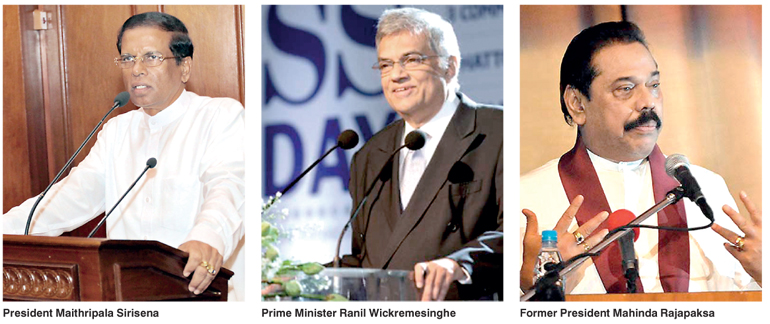Thursday Feb 19, 2026
Thursday Feb 19, 2026
Tuesday, 9 June 2015 00:02 - - {{hitsCtrl.values.hits}}
President Maithripala Sirisena miscalculated when he conjectured that he could coax the SLFP to accept Ranil Wickremesinghe the captain of the opposing team as not only coach but as match referee as well.
Patrimonial politics has occupied centre stage in the 140 days of the UNP-dominated interim Government. The question most asked in the makeshift corridors of momentary power is ‘who gets what and how fast?’
The UNP is not on a pilgrimage. It is on a desperate quest for permanency in power. Any altruistic claims to the contrary are mere malarkey. The institutions it seeks to fashion will respond to the regime they wish to install. Their State elites and societal organisations are busy building bridges appropriate for the immediate political environment and beyond.
True. The reform focused President as Common Candidate promised to make Ranil Wickremesinghe, the Leader of the UNP, the Prime Minister of an all-party Government that promised 100 feats, exploits and achievements in 100 days. Also true is that the reform agenda of the President, has run in to a blind alley in a patently hostile Parliament.

Abrasive display of insolence of power
The Government of the day has 40 UNPers holding ministerial office while it has only a total of 49 members in a 225-member House. Does it not imply that most of them needed ministerial perks to be persuaded on good governance?
Did he expect the new UNP Ministers to refrain from rewarding their party loyalists and business allies with the spoils of their newly-acquired power?
Did he really expect the ‘tenderpreneurs’ of the Rajapaksa regime to let go of the opportunity to trap the UNP Leader in ‘perpetual bondage’ in the Central Bank public debt fiasco?
To the utter exasperation of a nation that was celebrating the end of a regime that abused power, the first 100 days has treated them to the most abrasive display of insolence of power.
Did he seriously expect his party, the SLFP to either reluctantly accept or cuddle and clasp Ranil Wickremesinghe as both captain of the opposing team as well as coach and referee in the inevitable match that was to follow?
The SLFP and Maithripala
After 8 January the SLFP ranks were more than eager to reclaim their affable General Secretary as the helmsman of the party. Within the first week of his swearing-in, President Maithripala Sirisena retrieved the chairmanship of the SLFP from the clutches of his shell-shocked rival. A devastated Rajapaksa announced that he was bowing to the demand of party members and would hand over the leadership of the Sri Lanka Freedom Party to President Sirisena.
 When he mutinied against the Mahinda monolith, President Sirisena knew enough and more of the bitter disenchantment of a sizeable segment of his SLFP colleagues. He and the less than a handful of fellow defectors honestly believed that more would follow them before the ballot on 8 January. However, that did not happen. That hoped for event did not eventuate for a good reason.
When he mutinied against the Mahinda monolith, President Sirisena knew enough and more of the bitter disenchantment of a sizeable segment of his SLFP colleagues. He and the less than a handful of fellow defectors honestly believed that more would follow them before the ballot on 8 January. However, that did not happen. That hoped for event did not eventuate for a good reason.
It was not because the discontented were suddenly appeased by the regime. The wrath of the President astounded by the challenge of his General Secretary knew no bounds. The average SLFP Member of Parliament who considered a cross over found himself in agreement with Woody Allen. “I’m not afraid of death; I just don’t want to be there when it happens!” They were petrified in their derrières. That too needs an explanation.
Rajapaksa political apparatus
It did not take long for Mahinda Rajapaksa to gather his wits after the humiliating surprise of his defeat. Just 41 days later, on 18 February, the Nugegoda Rising occurred. The seasoned manipulators of the earlier order restored their leader into a serious challenger. They cling on to the hope that the change of 8 January is not a serious derailment of their gravy train.
The former President conducted periodic elections to fine-tune his political machine. It belonged to him. The UPFA was his flagship showroom. The SLFP was a defunct warehouse. Periodic elections served as the conduit for the distribution of favours and spoils to loyal retainers in the provinces. The exercise allowed him to create an elite cadre of operatives comprising of businessman, clergy and activists who had independent access to the boss. They were rewarded regularly after an assessment of their success in limiting opposition activity by means foul or fair.
The numbers garnered for the side and the reduction of the opposition vote was the measure of the loyalty to the leader. Their competence was rewarded in the form of a free hand to bend or break the law and to enjoy the perks of a peripheral potentate.
The Rajapaksa political apparatus was a market mechanism that permitted everyone to compete for positions. It enabled all players to seek spoils of power both legitimate and otherwise. It allowed some to boast openly that they spent sums in the range of Rs. 800 million at one election.
Aura of institutional propriety and legitimacy
The most ingenious feature of the Rajapaksa governance style was its cynical aura of institutional propriety and legitimacy. As was demonstrated in the impeachment of the Chief Justice, meticulous attention was paid to procedural niceties. The present General Secretary of the SLFP was assigned the task of conducting the kangaroo court. Most probably the dexterity he displayed earned him the trust of the Capo di tutti i capi which may have prompted his choice as the successor to the rebel General Secretary.
It is the cynical attachment to the integrity of process under the autocracy that made Susil Premajayantha to threaten to reinstall Mohan Pieris as and when they return to office. He also promised to dismantle the FCID and to prosecute its officers.
Political opposition
The Mahinda loyalists oppose the Ranil regime with which it has a symbiotic link. That is natural. Their Opposition conforms to the usual patterns of political opposition.
What is far worse is the perspective of the genuine Sirisena loyalists in the SLFP and other groups such as the JHU and the JVP. They resent Ranil’s style and that of his closest aides. They are incensed by the politics of spoils that many UNP Ministers practice with total disregard to the promised benchmarks of good governance.
The Sirisena loyalists of the SLFP are found on both sides of the aisle. It is the price of compulsory cohabitation that has stretched far beyond its promised term.
It was interesting to watch the contortions in the demeanour of the articulate and aggressive Deputy Minister of External Affairs Ajith Perera and the UNP National Organiser Daya Gamage at a recent television discussion with the JVP’s Sunil Handunnetti. The JVP Parliamentarian was educating the two UNPers of the politics of patronage as practiced by a chosen confidante of the Prime Minister.
“Go to Matara,” he advised the two members. “You will see how funds that are denied to Parliamentarians under the decentralised budget are disbursed by a politician who is not even a Member of Parliament,” he said, in mock indignation. He was referring to Sagala Ratnayake, former MP now designated as Chief of Staff in the office of the Prime Minister.
Yet another danger lurking
There is yet another danger lurking. Some civil society activists have been bankrolled by the interim administration through assignments of investigations and appointments to regulatory and facilitating bodies. Some Ministers have appointed employees of commercial undertakings controlled, owned or linked to them as directors of State-owned banks.
The cordial relations the Government enjoys with civil society activists should not be the result of economic dependence, either perceived or real. It compromises the independence of civil society which is the mainstay of the reform movement headed by the movement for a just society.
Already the fiercely-independent and outspoken activist Dambara Amila Thero has announced on a recent television discussion that it is time to launch a fresh civil society initiative to name and shame the politicians and collaborators who obstruct the reforms either overtly or covertly.
Maithripala’s choices increasing narrowing
The choices of President Maithripala Sirisena are increasing narrowing. It has reached a point where he will soon run out of space to manoeuvre the SLFP even into a simulated assignation with the UNP. The Opposition rightly believes that the present swagger of the Prime Minister in Parliament is due to BIRG [Basking In Reflected Glory]. The UNP that claims credit for the 19th Amendment chose to boycott the proceedings of the 18th Amendment they opine contemptuously.
An overwhelming majority in the present Parliament seem to share the worldview of Ophelia in Hamlet: “We know what we are but not what we may be.”